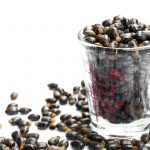Menopause and Retaining the Female Libido
A sexy woman is, by and large, a young and healthy woman. Typically a young, healthy, reasonably happy and sexy woman has a “normal” libido. A woman who has matured beyond her reproductive years may “suffer” from reduced libido, as all purveyors of aphrodisiacs will accuse; or, she may simply have new preoccupations. I would like to challenge the notion that attenuated libido in the older woman is pathological. It may not need to be “fixed.” What may be required is a reassessment of the role of sexual interaction in older adults.
In our youth and sex-obsessed culture, a menopausal woman might be tempted to feel completely “over the hill” … unless, of course, she couldn’t care less about staying perpetually youthful and sexy. Sexual innuendos are used to sell just about everything imaginable, including sex itself, which cheapens the concept into a marketing tool. Some women buy into this; some find it objectionable.
Sexual mating is fraught with uncertainties; it remains unclear to evolutionary biologists why sexual mating persists. Parthenogenesis could work just as well, with much less aggression and wasteful competition. It is, however, generally agreed that sexual mating allows for spectacularly complex telomeric exchange of genetic information, wherein the resultant diversity provides for hardiness, benefiting species survival.
Over-the-Counter Lifts for Waning Libidos
A quick look through the Internet uncovers reams of information on herbal tonics, melanocortin agonists, ancient potions, hormonal recipes, peripheral vasodilators and exotic exercises to help improve not only penis power, but also clitoral engorgement and vaginal lubrication. A sampling of the herbal tonics include, usually in some combination, Ashwagandha, Avena sativa, Black cohosh, Catuaba, Capsicum, Cnidium, Cistanche, Damiana, Epimedium (Horny Goat Weed), Ginkgo, Kudzu root, Licorice, Ligusticum, Maca, Muira puama, Passiflora incarnata, Red raspberry leaf, Sage, Tongkat ali, Tribulus terrestris and Yohimbe. Many of these work quite well – short term. Additionally, there are some zesty menthol-based topical irritants; there are books on Tantra; and there is the use of two grams per day of arginine to increase nitric oxide levels.
I have interviewed dozens of women on the topic of aging libido and tentatively conclude that, to a great extent, a strong libido in an older woman has two main causes, often concurrent. First, some women seem more genetically predisposed to desire and engage in sex through their senior years. Second, for women whom sexual desirability has been important as part of their self definition, their habit is to be and to remain sexual beings, with inclinations towards pursuits and activities that will likely result in more sexual mating.
Suggestions for Increasing Libido
While horniness at ovulation is completely understandable from a biological standpoint in the premenopausal woman, sexuality must inherently fulfill a different role in women past childbearing years. There should be little doubt that the most erogenous zone in humans is the brain. For women in particular, this kicks in after the biological urge to fornicate has been hormonally and physiologically subdued. Women who feel remorse or regret about their waning sex drive may take comfort in improving communication with their mates. If patients are in a partnered relationship, suggest they explore new ways to express love and affection: write tender notes, buy flowers, prepare a favorite meal, etc. Often, one partner will desire sex more than the other; the reluctant partner should be encouraged to seize the moment when the urge to engage sexually strikes. Encouragement is helpful, as well as regular sex dates, if scheduled for times when distractions are less likely.
It may be more comfortable for a patient to psych herself up alone through masturbation or watching a lascivious movie, although with the latter it is important that the partner not feel inadequate about not mastering the task of their partner’s arousal. Some couples enjoy titillating literature or video erotica together. If couples make the time to be playful and creative, dressing up or assuming theatrical roles, they won’t need lotions and potions. Remind patients that imagination is key to thwarting the trap of boredom or isolation. If a patient has grown too far apart from her mate to play together, sexual engagement will seem contrived or, worse, further alienating.
Sometimes desire is intact, but pain with intercourse makes it less appealing. Dyspareunia has various causes, but the most common in an imminently or frankly menopausal woman is compromised vaginal lubrication. My favorite remedy here is vitamin E. Patients can either pierce a 400 IU cap, or buy the vitamin E oil in ½- or 2-ounce bottles to keep handy by the bedside or in their purse. If vitamin E isn’t enough, E3 cream (estriol, compounded by a local pharmacist, 1mg per cc) is very effective, and confers no increased risk for ovarian, uterine or breast cancer. If fact, some research suggests that topical (and oral) E3 confers protection against breast cancer. A typical protocol calls for applying 1mg of E3 to the inner labia and distal vagina daily for about two weeks, then two to three times weekly for several months. This regimen may need to be prolonged, but sometimes enhanced lubrication can be kick-started with this protocol.
An often overlooked libido killer is prescription medication. Especially dampening for sex drive are anti-depressants (Elavil, Prozac, Zoloft, etc.) and heart medications, particularly the beta-blockers like Atenolol and timolol.
Even if patients can’t muster the “young” part of the young and healthy formula, it’s never too late for them to improve their health. Recommend they get enough sleep, stay hydrated and eat plenty of green vegetables. Oral vitamin E, 400 IUs or more daily, is helpful for stimulating vaginal lubrication and keeping the skin soft. A nice fringe benefit with regular vitamin E ingestion is reduced risk of both stroke and retinal deterioration. While no long-term safety studies exist – and therefore I prescribe cautiously, and as a last resort – a compounded testosterone cream (1mg per gram, ½-gram applied topically to the genital area shortly before anticipated sexual activity) works wonders for many women.
Emily A. Kane, ND, LAc was raised in North Africa. She came to America at age 16, graduated from Harvard University in 1978, and lived in Paris, Washington DC and New York City before coming to Seattle to begin naturopathic medical training. A graduate of Bastyr University in Seattle, she completed both the naturopathic and acupuncture/oriental medicine programs. Her preceptor work took place in Seattle, West Virginia and China, with emphasis on gynecology, counseling, herbal medicine and naturopathic manipulation. She worked as a licensed massage therapist in Seattle during her medical training for 7 years. Dr. Kane maintains an active clinical practice and sees patients of all ages.









